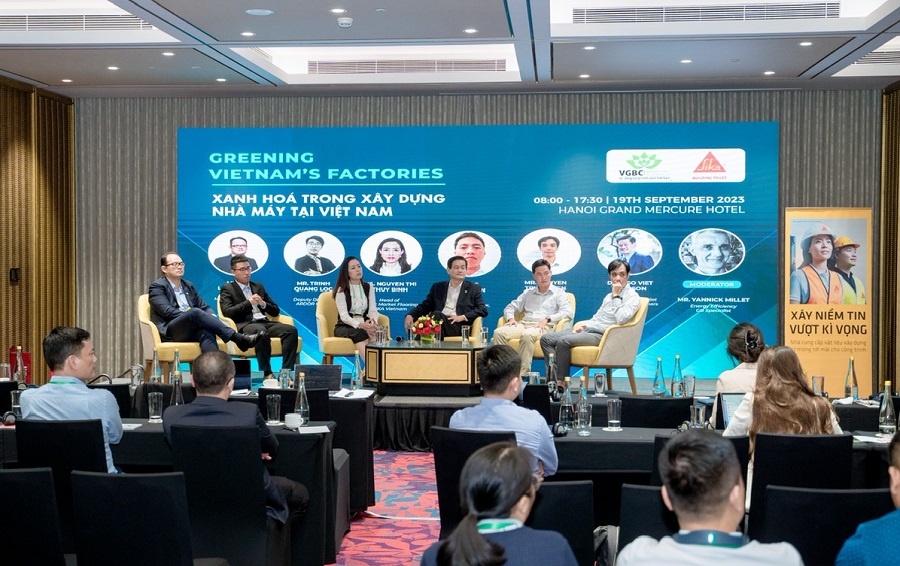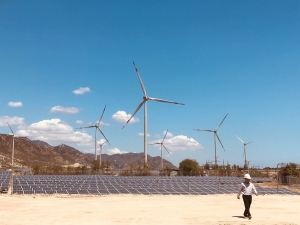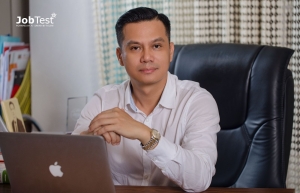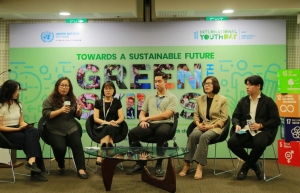Vietnam promotes shift to green production lines
 |
Snyder stated, "The VGBC is supporting domestic and foreign businesses in accessing and implementing green standards within construction projects. The council in also stepping up in-depth training for a wide range of professional personnel in the country."
"Investing in a green factory is one of the first steps on the road to greening production lines. The move will create conditions for investors and large businesses to envision achieving the net-zero goal by 2050 in the industrial sector," he said.
Southeast Asian countries like Thailand and Singapore have focused on the development of green industrial projects since 2007. However, this trend only began to capture more attention around 2010-2011, according to the VGBC.
Over the past decade, 234 projects have been granted green certificates in Vietnam, out of a total of 484 projects applying for them, according to updated data from the Green Building Information Gateway. This figure remains relatively modest compared to other regional peers.
According to the Vietnam Chamber of Commerce and Industry, many businesses are not aware of their environmental responsibilities. In addition, they do not have enough personnel with a clear understanding of environmental regulations.
Specifically, up to 44 per cent of domestic firms and 38 per cent of foreign-invested enterprises have admitted that they do not fully comply with environmental regulations.
Eunseo Lee, head of FDI Industrial Projects and TM Roofing at Sika Vietnam said, "There are still many challenges to implementing a green factory due to a lack of knowledge, cost concerns, and doubts about quality when handing over the project."
To ensure the efficiency of a project, it is crucial to create a durable facade to conserve energy and limit the impacts on the surrounding environment. The roof is directly exposed to the elements, and as such, it absorbs heat from the intense sunlight and needs to mitigate the risk of leaks due to the heavy rain in Vietnam.
Sika Vietnam is a wholly Swiss-owned company under Sika AG Group. With a presence in Vietnam since 1993, it has introduced the Sarnafil roofing solution with three outstanding features, including waterproof roofing systems that have the ability to reflect UV rays (a heat source) and save up to 10 per cent of the total energy consumption for cooling.
In addition, Sika's roof support system is equipped with solar panels to take advantage of the tropical climate, saving energy costs and creating added value after only five years of operation. Meanwhile, Sika's green roofing solution boasts outstanding waterproofing ability, reducing the heat island phenomenon and creating a natural resting area for workers at the factory.
Lee noted that all three solutions have been applied to many projects with green certificates from LEED, LOTUS, and EDGE in Vietnam. Some prime examples include the reflective roof for Tetra Pak and the energy-saving roof for the supermarket chain Go!
 | Vietnam to become green manufacturing hub by 2050 through net zero approach Vietnam’s commitment to achieving net zero emissions by 2050 at COP26 is expected to bring a tailwind of opportunities, helping to turn the country into a green manufacturing hub and facilitating the export of made-in-Vietnam products into the markets of developed nations. |
 | Green workforce crucial to a green economy The Vietnamese government is targeting green growth with policies and international commitments towards the green economy. Nguyen Cong Thuy, founder and CEO of HRDC, discusses the influence of the green workforce on sustainable development. |
 | 'Green skills vital' for green transition Organised by the United Nations in Vietnam on August 11, this year’s International Youth Day focussed on the role of education and highlighted the importance of teaching green skills to young people, so they can move towards a brighter, greener, and more sustainable future for Vietnam. |
What the stars mean:
★ Poor ★ ★ Promising ★★★ Good ★★★★ Very good ★★★★★ Exceptional
 Tag:
Tag:
Related Contents
Latest News
More News
- Trung Nam-Sideros River consortium wins bid for LNG venture (January 30, 2026 | 11:16)
- Vietnam moves towards market-based fuel management with E10 rollout (January 30, 2026 | 11:10)
- Envision Energy, REE Group partner on 128MW wind projects (January 30, 2026 | 10:58)
- Vingroup consults on carbon credits for electric vehicle charging network (January 28, 2026 | 11:04)
- Bac Ai Pumped Storage Hydropower Plant to enter peak construction phase (January 27, 2026 | 08:00)
- ASEAN could scale up sustainable aviation fuel by 2050 (January 24, 2026 | 10:19)
- 64,000 hectares of sea allocated for offshore wind surveys (January 22, 2026 | 20:23)
- EVN secures financing for Quang Trach II LNG power plant (January 17, 2026 | 15:55)
- PC1 teams up with DENZAI on regional wind projects (January 16, 2026 | 21:18)
- Innovation and ESG practices drive green transition in the digital era (January 16, 2026 | 16:51)






















 Mobile Version
Mobile Version